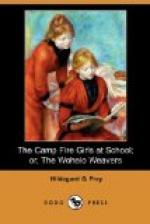This question was an acute one with Migwan. She had not had a new party dress for several years, and in the present state of their finances she could not get one now. She looked at the old one, faded and spotted, and shook her head despairingly. “I foresee where Miss Migwan develops a sudden illness on the night of the party,” she said with tight lips, “unless I hear from my story in time.” As if in answer to her thoughts the story came back the very next day. There was no letter from the editor concerning the merits or faults of the piece, only a printed rejection slip, but that stated that only typewritten manuscripts would be considered. Migwan’s air castle tumbled about her ears. She had no typewriter and knew no one who had. Her experience did not include a knowledge of public stenographers, and even if she had thought of that way out the expense would have prevented her from having her story copied. Her dream of fame and wealth was short-lived, and the world was stale, flat and unprofitable. The house was not yet rented, as the repairs had been delayed again and again. It would be another month at least before that would be a paying proposition. Hearing the other girls talk about Gladys’s party all the time filled her with desperation. She began to shun the Winnebagos. The keen zest went out of her studying and even her beloved Latin lost its savor.
Nyoda finally noticed it. Migwan failed to recite in English class for two days in succession, which was an unheard-of thing. Nyoda thought that Migwan had her head so full of the coming party that she was neglecting her lessons, and said so, half banteringly, as Migwan lingered after class to pick up some papers she had dropped on the floor. That was the last straw, and Migwan burst into tears. Nyoda was all sympathy in a moment. Now Nyoda happened to have the “seeing eye,” with which some people are blessed, and had surmised, from certain little signs she had observed, that Migwan had written something or other, and sent it away to a magazine. She knew only too well what the outcome would be, and her heart ached when she thought of Migwan’s coming disappointment. Therefore, when Migwan, quickly recovering her composure, said calmly, “It’s nothing, Nyoda; I simply tried to do something and failed,” Nyoda asked quietly, “Did your story come back?”
Migwan looked at her in amazement. “How did you know I had written any story?” she asked.
“Oh, a little bird told me,” replied Nyoda lightly. “Cheer up. All the famous authors had their first work rejected. You have achieved the first mark of fame.” Migwan smiled wanly. Her tragedies always seemed to lose their sting in the light of Nyoda’s optimism. She told her about the necessity for a typewriter. “I could have told you that to begin with, if you had asked my humble advice,” replied Nyoda. “But if a miserable writing machine is all that stands between you and fame and fortune, your fortune is already made. The woman whose rooms I am living in has one in her possession. It belongs to her son, I believe, but as he is at present in China there is no danger of his wanting it for some time. She has offered to let me use it on several occasions, and I don’t doubt but what we can make some arrangement to accommodate you.”




